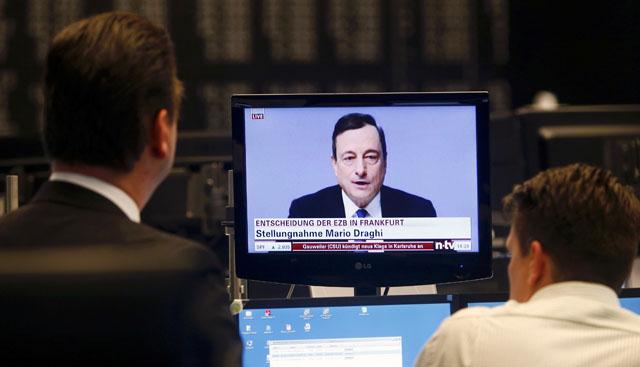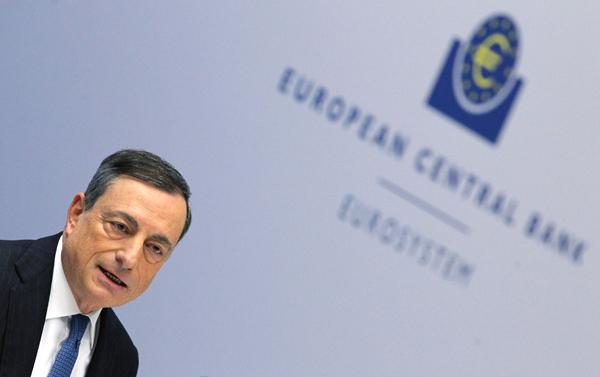You are here
Euro slides below $1.15 for first time since November 2003
By AFP - Jan 17,2015 - Last updated at Jan 17,2015
NEW YORK — The euro fell Friday against the dollar on growing expectation that the European Central Bank (ECB) will launch stimulus this week to jump-start the ailing eurozone economy.
The euro fell below $1.15 for the first time since November 2003, before recovering to trade at $1.1566 around 2200 GMT. Late Thursday, the shared European currency traded at $1.1623.
Official European Union (EU) data reported Friday further fueled speculation that the ECB will announce a large asset-purchase programme after its monetary policy meeting Thursday to counter the risk of deflation in the 19-nation currency bloc.
Eurostat confirmed prior data showing that eurozone inflation fell into negative territory in December, with consumer prices down 0.2 per cent. On a year-over-year basis, inflation was the weakest since September 2009, at 0.8 per cent well below the ECB's target of close to 2 per cent.
Kathy Lien of BK Asset Management said in a market note that the question that everyone is now asking is whether the euro "will turn into another big loser" like oil and copper "or a big winner that will save funds at the brink of collapse" after the Swiss National Bank (SNB) removed its cap on the franc's rate with the euro.
"Smart investors won't wait that long for an answer because since June, the euro has fallen more than 15 per cent against the US dollar with approximately half of those losses incurred over the past four weeks," she added.
"With arguably the biggest bull in the euro market no longer supporting price, no wonder EUR-crosses have collapsed in the wake of the SNB's latest decision," said Christopher Vecchio of DailyFX.
According to Saturday's FT, the ECB will this week announce plans to directly buy government bonds, creating new money to fight off possible deflation despite German objections.
The ECB holds its first policy meeting of the year on Thursday and is widely expected to announce some sort of programme of sovereign bond purchases, or quantitive easing, to try to kick-start the eurozone's sluggish economy.
Germany is concerned such a programme amounts to direct fiscal support for profligate states, taking away the pressure to push through tough economic reforms.
Conscious of German objections, the bonds will be underwritten by individual states in order to reassure German taxpayers that they will not be on the hook in the event of a default, according to the FT, raising separate issues about the principle of risk sharing.
"There are a series of trade-offs involved in [designing QE] and whatever is announced will probably not satisfy everyone," Ken Wattret, economist at BNP Paribas, told the FT.
"Any adverse impact stemming from a reluctance to mutualise risk could be offset by a strong signal that the ECB is willing to buy in large scale in order to raise inflation expectations," he said.
German news magazine Der Spiegel reported on Friday that national central banks would only be allowed to buy the sovereign debt of their respective countries, to ensure they alone carried the risk of a possible default by their government.
The weekly said ECB chief Mario Draghi had presented the scheme to German Chancellor Angela Merkel and Finance Minister Wolfgang Schaeuble in a meeting on Wednesday.
The central bank widely reported to be considering purchases worth at least 500 billion euros or to pledge to buy sovereign debt until inflation approaches two per cent, said the FT report.
Falling prices could prove damaging for EU firms as consumers put off purchasing goods and for governments ladened with fixed-rate debt.
ECB January 22 meeting to examine launching sovereign debt purchase: board member
"We will take the American and British experiences into account in order to determine the amount of debt to buy so as to reestablish confidence and bring inflation back to a level close to and lower than 2 per cent, while keeping in mind the institutional specificities of the eurozone," Benoit Coeure, an ECB board member, told French newspaper Liberation on Friday.
"We should also decide if the purchase would concern the debt of certain countries or if it should be balanced across the entire eurozone," said Coeure.
Coeure stressed that the aim of such a stimulus operation is to "ensure confidence in the capacity of the central bank to stabilise inflation".
The French ECB board member said that there is an increasing risk that "growth and inflation remain constantly weak, that we slump into an 'economy of 1 per cent — growth at 1 per cent and inflation at 1 per cent".
"This prospect is sufficiently dangerous for us to be worried about," he added.
Coeure also said the Islamist attacks in France has made it even more important for Europeans to stand united "including in the economic sphere".
"The attacks have underlined that a part of European youth are on the fringes, have dropped out, are jobless, at risk and in extreme cases, led astray in delinquency and even terrorism. Without growth, this phenomenon can only worsen," he indicated.
Touching on another burning question surrounding the bloc, the ECB board member said there is "no question of Greece leaving the euro" following January 25 elections which are feared to bring anti-austerity party Syriza to power.
"The stakes of the election are elsewhere, it's the composition of the cocktail of reforms that will allow this country to definitively exit the crisis and to further integrate with European economies," he indicated.
Related Articles
The European Central Bank (ECB) took the ultimate policy leap on Thursday, launching a government bond-buying programme which will pump hundreds of billions in new money into a sagging eurozone economy.
FRANKFURT — European Central Bank (ECB) chief Christine Lagarde on Thursday said it was "too early" to consider winding down pandemic suppor
FRANKFURT — The European Central Bank (ECB) eased policy further on Thursday to fight stubbornly low inflation but kept much of its powder d



















